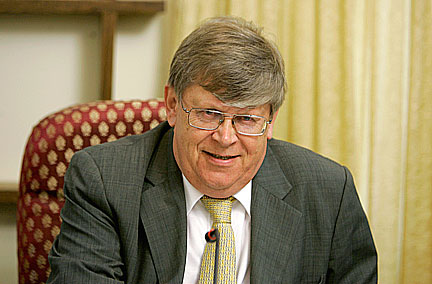ID :
375602
Wed, 07/29/2015 - 10:52
Auther :
Shortlink :
https://oananews.org//node/375602
The shortlink copeid
Verification of Iran's nuclear program may take 5 years

Baku, Azerbaijan, July 28
By Dalga Khatinoglu - Trend:
Former Deputy Director-General of the International Atomic Energy Agency believes the achieved nuclear deal between Iran and P5+1 has strengths and weaknesses.
Two weeks after achieving a comprehensive nuclear deal, the Joint Comprehensive Plan of Action (JCPOA) has been snagged for approval by lawmakers of both American Republicans as well as Iran's hardliners.
The U.S. Republicans argues that the achieved JCPOA is not enough to insure Iran's nuclear program would remain peaceful, while Iranian hardliners says the agreement has damaged Iran's rights.
Olli Heinonen, the former Deputy Director-General for Safeguards at the International Atomic Energy Agency (IAEA) told Trend July 28 that JCPOA has its strengths and its weaknesses. "From the technical point of view, we see that Iran has not changed its nuclear course. Iran will develop further its uranium enrichment capabilities without real technical or economical needs; there is a well functioning world market for enriched uranium and nuclear fuel with adequate production capacities for next couple of decades to come".
He said, "I also note that Iran has not embarked on a course of real nuclear transparency. The agreement includes a provisional implementation of the Additional Protocol until the IAEA reaches the conclusion that Iran's nuclear program is entirely peaceful. This is an unprecedented requirement, which none of the other 124 countries, who have currently Additional Protocols in force, have asked for. Only after such positive conclusion Iran will seek the ratification of the protocol. Nevertheless, Iran has now got yet another chance to restore its non- proliferation credentials."
Heinonen who currently serves as a senior fellow at Harvard University's Belfer Center for Science and International Affairs believes that verification of Iran's nuclear program could take more than 5 years.
Responding to a question about the needed time for the IAEA to verify Iran's nuclear program, Heinonen said, "This depends on two basic factors. Iran's full cooperation is certainly indispensable, but it also depends on the approach the IAEA takes to investigate past nuclear activities of Iran and on the financial and human resources the Agency will get to do the job. I do not expect that this task will be completed in less than five years when noting the rigorous standards applied by the IAEA."
Iran also agreed to approve the Additional protocol based on the JCPOA. The Additional Protocol allows unannounced inspections outside of declared nuclear sites and it is seen as a vital tool at the IAEA's disposal to make sure that a country does not have any hidden nuclear work.
Addressing the possibility of insuring the lack of any undeclared nuclear facility or developing nuclear weapon secretly by implementation of Additional Protocol, Heinonen believes that "no verification regime or intelligence gathering and analysis system can provide timely and full assurances about absence of undeclared nuclear material activities in a large country with a remarkable nuclear know- how and infrastructure. The Additional Protocol provides the IAEA with additional tools, but it is not designed to explore fully past nuclear activities".
Based on nuclear agreement, P5+1 countries and international participants will engage in joint projects with Iran, including through IAEA technical cooperation projects, in the field of peaceful nuclear technology, including nuclear power plants, research reactors, fuel fabrication, agreed joint advanced R&D such as fusion, establishment of a state-of-the-art regional nuclear medical centre, personnel training, nuclear safety and security, and environmental protection.
On the nuclear safety issue Heinonen said that the P5+1 agreed to assist Iran in getting access to safe and modern nuclear technology. "According to the JCPOA Iran will get also support in hardening its nuclear program against sabotage and cyber attacks, which is understandable, at least, from the point of view of its neighbors. However, I do not think that the international community will hail that fact that Iran does not adhere, inter alia, to the IAEA nuclear safety convention. Iran is the only country in world operating a full size nuclear power plant without being party to such an agreement, which includes international peer reviews to demonstrate the compliance of the party with modern nuclear safety standards. I feel that this part of the agreement does not meet policies of all European countries".
Edited by CN
Stay up to date with latest Iran news on our specialized Facebook page
Follow us on Twitter @TRENDNewsAgency





